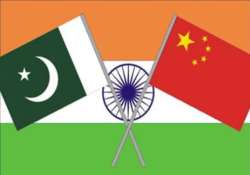China, India competing in South Asia: Pakistani daily
Islamabad: The competition between India and China to gain diplomatic one-upmanship in South Asia, from Sri Lanka to Maldives, exposes a strategic necessity, a leading Pakistani daily said Monday.According to the article in Dawn by

Islamabad: The competition between India and China to gain diplomatic one-upmanship in South Asia, from Sri Lanka to Maldives, exposes a strategic necessity, a leading Pakistani daily said Monday.
According to the article in Dawn by Zarrar Khuhro, the civil nuclear deal between India and Sri Lanka, signed during Sri Lankan President Maithripala Sirisena's visit to India last week capped efforts by India to roll back Chinese influence on the island nation, with the previous government in Sri Lanka having made it a point to move closer to China.
"Under Rajapaksa, Colombo had increased defence cooperation with China, which was also funding the construction of a port in Colombo. In addition to this, China has, over the last nine years or so, provided Sri Lanka with substantial soft loans largely for infrastructure projects," Khuhro said.
He noted that for Modi, the civil nuclear deal with Sri Lanka was being billed as his first "big ticket achievement" in the field of diplomacy.
"The same kind of tug of war can be seen in the Maldives, where China and India are vying to develop a crucial military port," the article said.
Khuhro pointed out that when Male's main water plant burned down last December, causing a severe drinking water crisis, India immediately responded by sending supplies of drinking water to the Maldives. Not to be left behind, China also despatched naval and air vessels loaded with drinking water.
"The answer as to why China wants to improve relations with Sri Lanka and the Maldives lies in what a 2005 US report called the 'String of Pearls' - a series of naval bases meant to secure China's lifeline," the article said.
China wants to secure the naval trade routes that stretch from China's eastern coast all the way around southeast Asia, through the Indian Ocean and to points beyond, in the Persian Gulf and Africa, Khuhro explained.
"China itself prefers the term 'Maritime silk route', claiming that all Beijing wants is access to these waterways and not naval bases per se," the article said.
The article noted that this might be seen by some Indian strategists as a Chinese attempt to encircle India in conjunction with Pakistan.
"China's own concerns are larger, and the nightmare of a hostile US (currently in the midst of its Asian pivot) choking off China's lifeline looms large," the article said, adding that Obama's visit to India last month magnified such fears.
"It seems fairly apparent that the US' new strategic focus will be seen in India as an opportunity to create an alliance aimed at countering and possibly containing China," Khuhro said.
He said that it was no coincidence that while Obama was in India, Pakistan army chief Raheel Sharif was in China and that "there can in fact be no clearer signal of which strategic orbit Pakistan has chosen."
However, there is little choice in the matter for Pakistan, and its relations with India make the idea of China and India competing to woo Pakistan a laughable one, Khuhro said, adding that China offered Pakistan a way to leverage its geographical position into economic gain and security.
"Pakistan China Economic Corridor (PCEC) offers China an alternate route to the Arabian Sea, reducing its dependence on the maritime route. It also links the underdeveloped western parts of China with the global economy," the article said.
It noted that this was crucial for China, which tended to believe that prosperity settled most arguments, and felt that if the western regions were developed, it would take the wind out of the sails of the Uighur rebels.
For Pakistan, "the areas around the route of PCEC will no doubt benefit economically, and give the residents and locals a stake in peace and development," the article said.